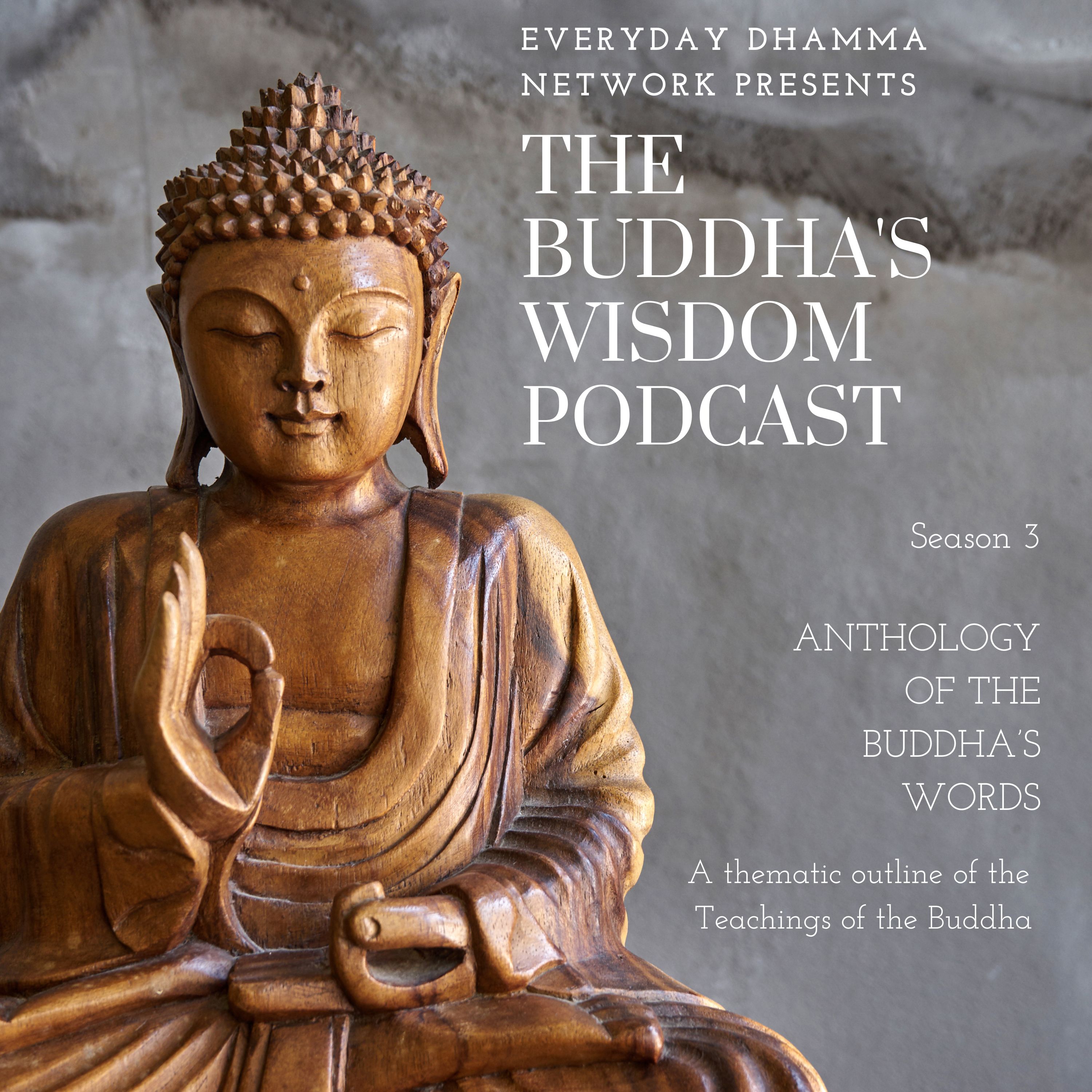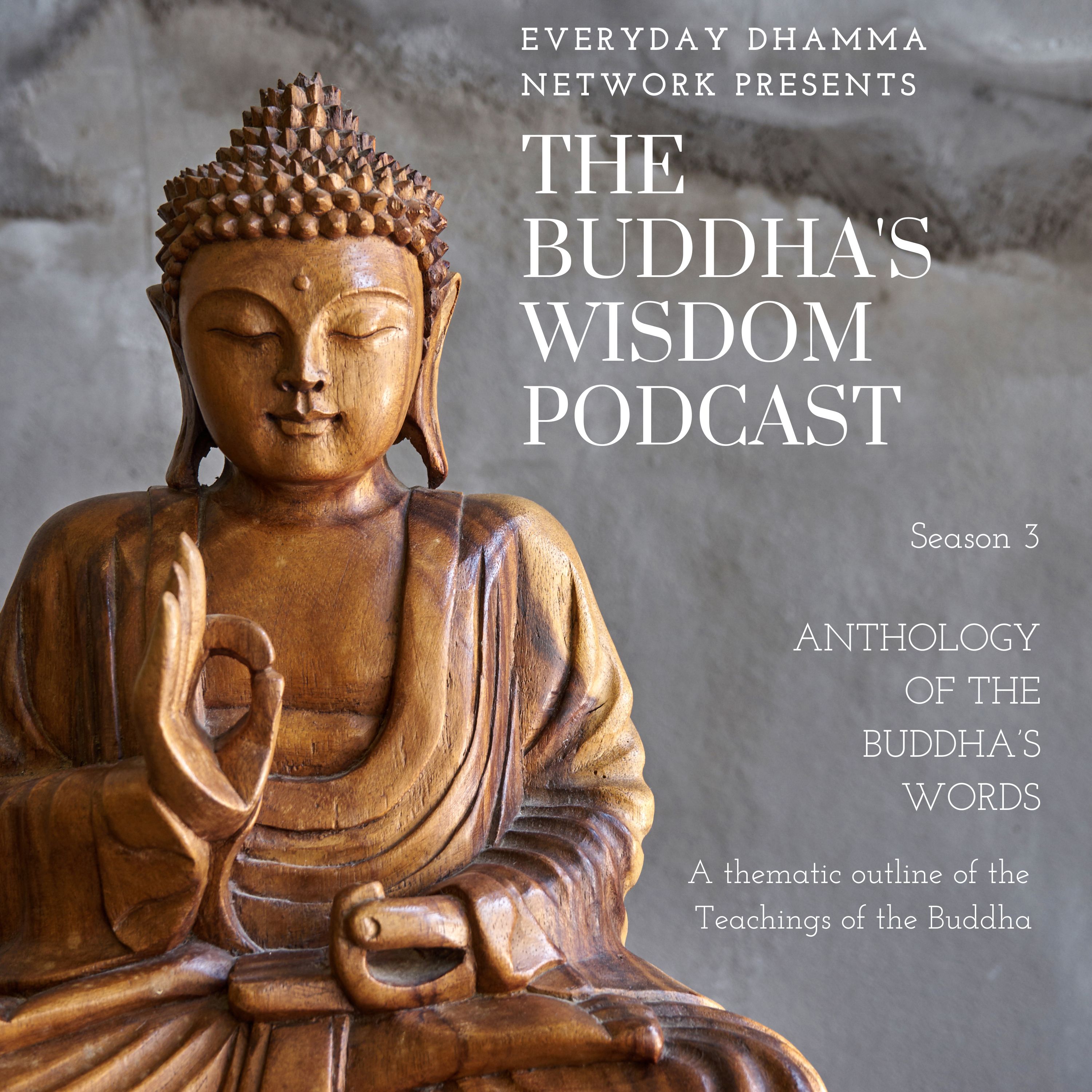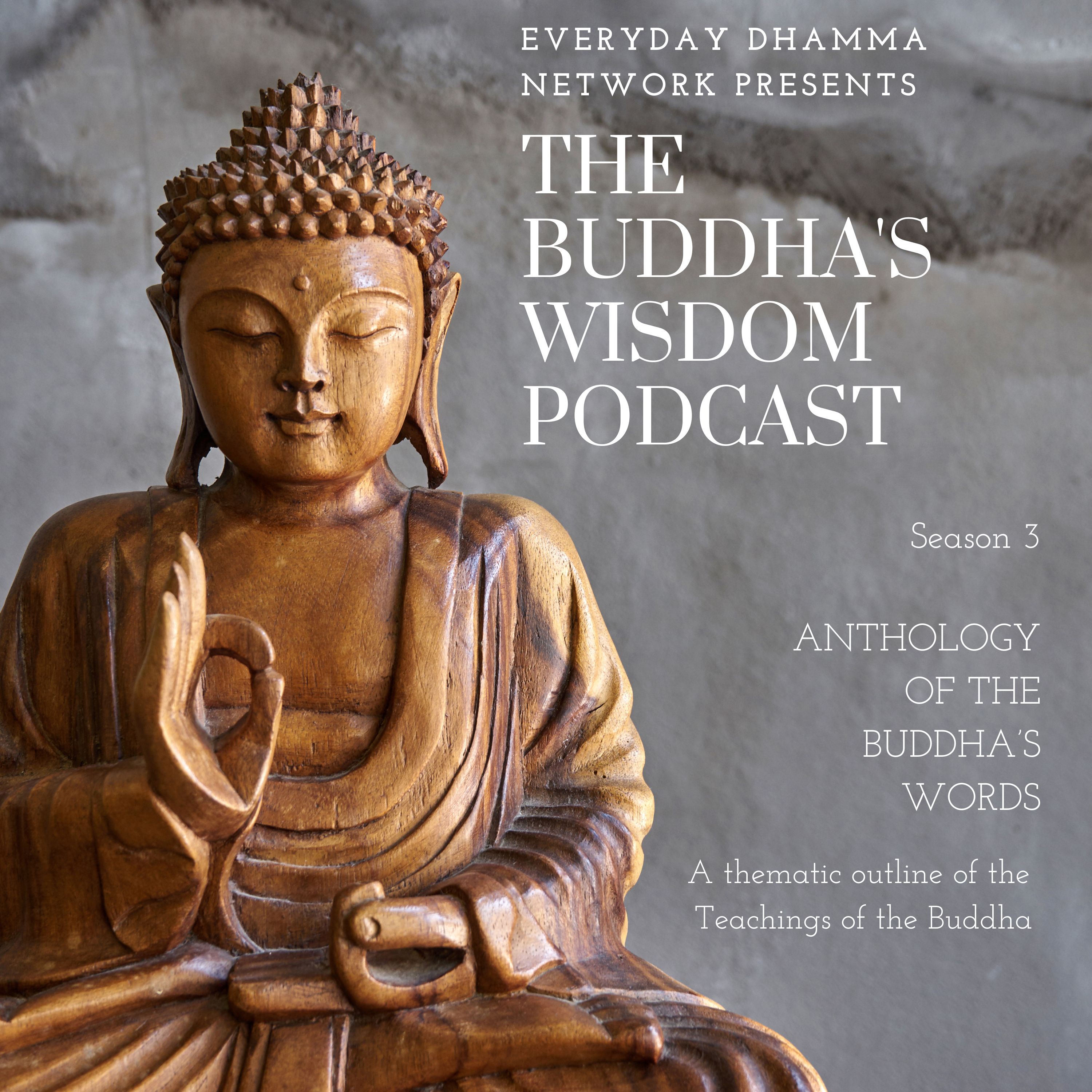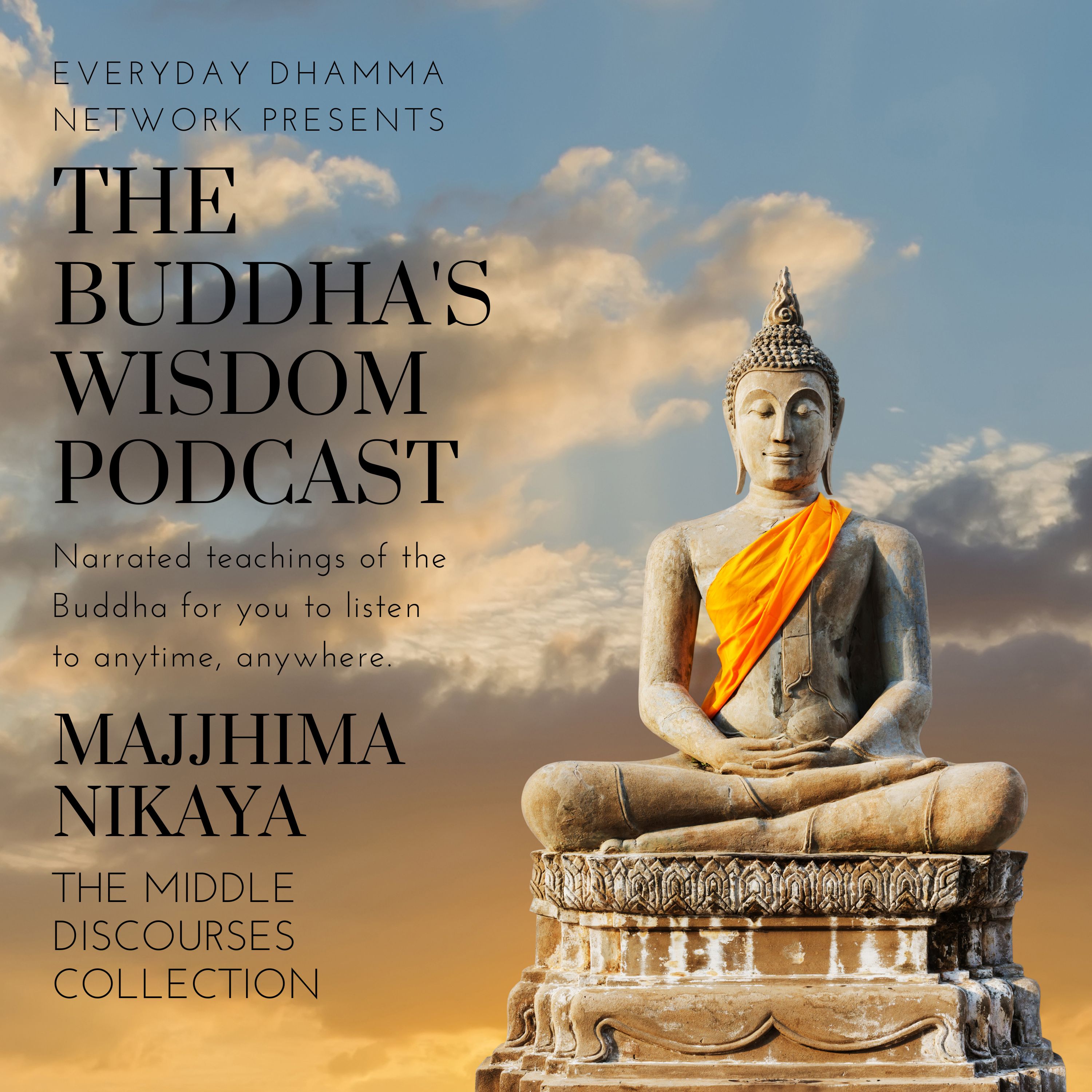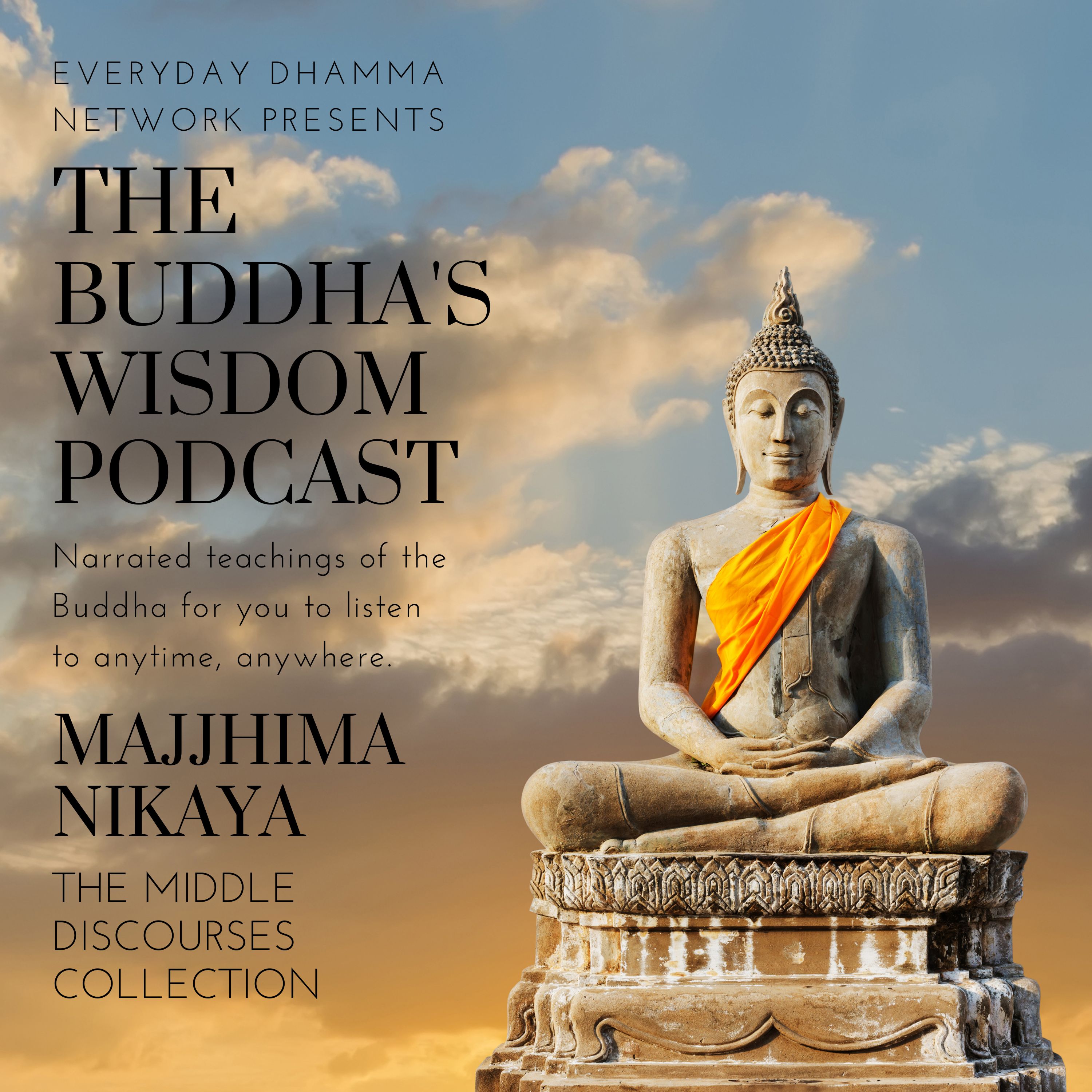Episode Transcript
## Sutta 1 - Meritorious Deeds
“Mendicants, don’t fear good deeds. For ‘good deeds’ is a term for happiness, for what is likable, desirable, and agreeable. I recall undergoing for a long time the likable, desirable, and agreeable results of good deeds performed over a long time. Having developed a mind of love for seven years, for seven eons of the cosmos contracting and expanding I didn’t return to this world again. As the eon contracted I went to the realm of streaming radiance. As it expanded I was reborn in an empty mansion of divinity.
There I was the Divinity, the Great Divinity, the vanquisher, the unvanquished, the universal seer, the wielder of power. I was Sakka, lord of gods, thirty-six times. Many hundreds of times I was a king, a wheel-turning monarch, a just and principled king. My dominion extended to all four sides, I achieved stability in the country, and I possessed the seven treasures. Not to mention regional kingship!
Then I thought, ‘Of what deed of mine is this the fruit and result, that I am now so mighty and powerful?’ Then I thought, ‘It is the fruit and result of three kinds of deeds: giving, self-control, and restraint.’”
It 22; 14-15
## Sutta 2 - Three Bases of Merit
“Mendicants, there are these three grounds for making merit. What three? Giving, ethical conduct, and meditation are all grounds for making merit.
First, someone has practiced a little giving and ethical conduct as grounds for making merit, but they haven’t got as far as meditation as a ground for making merit. When their body breaks up, after death, they’re reborn among disadvantaged humans.
Next, someone has practiced a moderate amount of giving and ethical conduct as grounds for making merit, but they haven’t got as far as meditation as a ground for making merit. When their body breaks up, after death, they’re reborn among well-off humans.
Next, someone has practiced to an extraordinary degree giving and ethical conduct as grounds for making merit, but they haven’t got as far as meditation as a ground for making merit. When their body breaks up, after death, they’re reborn in the company of the gods of the four great kings. There, the four great kings themselves have practiced giving and ethical conduct as grounds for making merit to a greater degree than the other gods. So they surpass them in ten respects: heavenly lifespan, beauty, happiness, glory, sovereignty, sights, sounds, smells, tastes, and touches.
Next, someone has practiced to an extraordinary degree giving and ethical conduct as grounds for making merit, but they haven’t got as far as meditation as a ground for making merit. When their body breaks up, after death, they’re reborn in the company of the gods of the thirty-three. There, Sakka, lord of gods, has practiced giving and ethical conduct as grounds for making merit to a greater degree than the other gods. So he surpasses them in ten respects …
Next, someone has practiced to an extraordinary degree giving and ethical conduct as grounds for making merit, but they haven’t got as far as meditation as a ground for making merit. When their body breaks up, after death, they’re reborn in the company of the gods of Yama. There, the godling Suyāma has practiced giving and ethical conduct as grounds for making merit to a greater degree than the other gods. So he surpasses them in ten respects …
Next, someone has practiced to an extraordinary degree giving and ethical conduct as grounds for making merit, but they haven’t got as far as meditation as a ground for making merit. When their body breaks up, after death, they’re reborn in the company of the joyful gods. There, the godling Santusita has practiced giving and ethical conduct as grounds for making merit to a greater degree than the other gods. So he surpasses them in ten respects …
Next, someone has practiced to an extraordinary degree giving and ethical conduct as grounds for making merit, but they haven’t got as far as meditation as a ground for making merit. When their body breaks up, after death, they’re reborn in the company of the gods who love to create. There, the godling Sunimmita has practiced giving and ethical conduct as grounds for making merit to a greater degree than the other gods. So he surpasses them in ten respects …
Next, someone has practiced to an extraordinary degree giving and ethical conduct as grounds for making merit, but they haven’t got as far as meditation as a ground for making merit. When their body breaks up, after death, they’re reborn in the company of the gods who control what is created by others. There, the godling Vasavattī has practiced giving and ethical conduct as grounds for making merit to a greater degree than the other gods. So he surpasses them in ten respects: heavenly lifespan, beauty, happiness, glory, sovereignty, sights, sounds, smells, tastes, and touches.
These are the three grounds for making merit.”
AN 8:36
## Sutta 3 - The Best Kinds of Confidence
“Mendicants, these four kinds of confidence are the best. What four?
The Realized One, the perfected one, the fully awakened Buddha, is said to be the best of all sentient beings—be they footless, with two feet, four feet, or many feet; with form or formless; with perception or without perception or with neither perception nor non-perception. Those who have confidence in the Buddha have confidence in the best. Having confidence in the best, the result is the best.
The noble eightfold path is said to be the best of all conditioned things. Those who have confidence in the noble eightfold path have confidence in the best. Having confidence in the best, the result is the best.
Fading away is said to be the best of all things whether conditioned or unconditioned. That is, the quelling of vanity, the removing of thirst, the abolishing of clinging, the breaking of the round, the ending of craving, fading away, cessation, extinguishment. Those who have confidence in the teaching of fading away have confidence in the best. Having confidence in the best, the result is the best.
The Saṅgha of the Realized One’s disciples is said to be the best of all communities and groups. It consists of the four pairs, the eight individual persons. This is the Saṅgha of the Buddha’s disciples that is worthy of offerings dedicated to the gods, worthy of hospitality, worthy of a religious donation, worthy of greeting with joined palms, and is the supreme field of merit for the world. Those who have confidence in the Saṅgha have confidence in the best. Having confidence in the best, the result is the best.
These are the four best kinds of confidence.
> For those who, knowing the best teaching,base their confidence on the best—confident in the best Awakened One,supremely worthy of a religious donation;
>
>
> confident in the best teaching,the bliss of fading and stilling;confident in the best Saṅgha,the supreme field of merit—
>
> giving gifts to the best,the best of merit grows:the best lifespan, beauty,fame, reputation, happiness, and strength.
>
> An intelligent person gives to the best,settled on the best teaching.When they become a god or human,they rejoice at reaching the best.”
>
AN 4:34; II 34-35
## Sutta 4 - If People Knew the Result of Giving
“Mendicants, if sentient beings only knew, as I do, the fruit of giving and sharing, they would not eat without first giving, and the stain of stinginess would not occupy their minds. They would not eat without sharing even their last mouthful, their last morsel, so long as there was someone to receive it. It is because sentient beings do not know, as I do, the fruit of giving and sharing, that they eat without first giving, and the stain of stinginess occupies their minds.”
It 26; 18-19
## Sutta 5 - Reasons for Giving
“Mendicants, there are these eight grounds for giving. What eight? Someone might give a gift out of favoritism or hostility or stupidity or cowardice. Or they give thinking, ‘Giving was practiced by my father and my father’s father. It would not be right for me to abandon this family tradition.’ Or they give thinking, ‘After I’ve given this gift, when my body breaks up, after death, I’ll be reborn in a good place, a heavenly realm.’ Or they give thinking, ‘When giving this gift my mind becomes clear, and I become happy and joyful.’ Or they give a gift thinking, ‘This is an adornment and requisite for the mind.’ These are the eight grounds for giving.”
AN 8:33; Iv 236-37
## Sutta 6 - The Gift of Food
Then the Buddha robed up in the morning and, taking his bowl and robe, went to the home of Suppavāsā the Koliyan, where he sat on the seat spread out. Then Suppavāsā served and satisfied the Buddha with her own hands with delicious fresh and cooked foods. When the Buddha had eaten and washed his hand and bowl, she sat down to one side. The Buddha said to her:
“Suppavāsā, when a noble disciple gives food, she gives the recipients four things. What four? Long life, beauty, happiness, and strength. Giving long life, she has long life as a god or human. Giving beauty, she has beauty as a god or human. Giving happiness, she has happiness as a god or human. Giving strength, she has strength as a god or human. When a noble disciple gives food, she gives the recipients these four things.
AN 4:57; II 62-63
## Sutta 7 - A True Person’s Gifts
“There are these five gifts of a true person. What five? They give a gift out of faith. They give a gift carefully. They give a gift at the right time. They give a gift with no strings attached. They give a gift without damaging themselves or others.
Having given a gift out of faith, in whatever place the result of that gift manifests they become rich, affluent, and wealthy. And they’re attractive, good-looking, lovely, of surpassing beauty.
Having given a gift carefully, in whatever place the result of that gift manifests they become rich, affluent, and wealthy. And their children, wives, bondservants, servants, and workers want to listen. They actively listen and try to understand.
Having given a gift at the right time, in whatever place the result of that gift manifests they become rich, affluent, and wealthy. And when the time is right, their needs are amply satisfied.
Having given a gift with no strings attached, in whatever place the result of that gift manifests they become rich, affluent, and wealthy. And their mind tends to enjoy the five refined kinds of sensual stimulation.
Having given a gift without damaging themselves or others, in whatever place the result of that gift manifests they become rich, affluent, and wealthy. And no damage comes to their property from anywhere, whether fire, flood, rulers, bandits, or unloved heirs.
These are the five gifts of a true person.”
AN 5:148; III 172-173
## Sutta 8 - Mutual Support
“Mendicants, brahmins and householders are very helpful to you, as they provide you with robes, almsfood, lodgings, and medicines and supplies for the sick. And you are very helpful to brahmins and householders, as you teach them the Dhamma that’s good in the beginning, good in the middle, and good in the end, meaningful and well-phrased. And you reveal a spiritual practice that’s entirely full and pure. That is how this spiritual path is lived supporting each other in order to cross over the flood and make a complete end of suffering.”
It 107; 111
## Sutta 9 - Rebirth on Account of Giving
“Mendicants, there are these eight rebirths by giving. What eight?
First, someone gives to ascetics or brahmins such things as food, drink, clothing, vehicles; garlands, fragrance, and makeup; and bed, house, and lighting. Whatever they give they expect back. They see a well-to-do aristocrat or brahmin or householder amusing themselves, supplied and provided with the five kinds of sensual stimulation. It occurs to them: ‘If only, when my body breaks up, after death, I would be reborn in the company of well-to-do aristocrats or brahmins or householders!’ They settle on that thought, stabilize it, and develop it. As they’ve settled for less and not developed further, their thought leads to rebirth there. When their body breaks up, after death, they’re reborn in the company of well-to-do aristocrats or brahmins or householders. But I say that this is only for those of ethical conduct, not for the unethical. The heart’s wish of an ethical person succeeds because of their purity.
Next, someone gives to ascetics or brahmins … Whatever they give they expect back. And they’ve heard: ‘The gods of the four great kings are long-lived, beautiful, and very happy.’ It occurs to them: ‘If only, when my body breaks up, after death, I would be reborn in the company of the gods of the four great kings!’ … When their body breaks up, after death, they’re reborn in the company of the gods of the four great kings. But I say that this is only for those of ethical conduct, not for the unethical. The heart’s wish of an ethical person succeeds because of their purity.
Next, someone gives to ascetics or brahmins … Whatever they give they expect back. And they’ve heard: ‘The gods of the thirty-three …’
‘The gods of Yama …’
‘The joyful gods …’
‘The gods who love to create …’
‘The gods who control what is created by others are long-lived, beautiful, and very happy.’ It occurs to them: ‘If only, when my body breaks up, after death, I would be reborn in the company of the gods who control what is created by others!’ They settle on that thought, stabilize it, and develop it. As they’ve settled for less and not developed further, their thought leads to rebirth there. When their body breaks up, after death, they’re reborn in the company of the gods who control what is created by others. But I say that this is only for those of ethical conduct, not for the unethical. The heart’s wish of an ethical person succeeds because of their purity.
Next, someone gives to ascetics or brahmins such things as food, drink, clothing, vehicles; garlands, fragrance, and makeup; and bed, house, and lighting. Whatever they give they expect back. And they’ve heard: ‘The gods of the Divinity’s host are long-lived, beautiful, and very happy.’ It occurs to them: ‘If only, when my body breaks up, after death, I would be reborn in the company of the gods of the Divinity’s host!’ They settle on that thought, stabilize it, and develop it. As they’ve settled for less and not developed further, their thought leads to rebirth there. When their body breaks up, after death, they’re reborn in the company of the gods of the Divinity’s host. But I say that this is only for those of ethical conduct, not for the unethical. And for those free of desire, not those with desire. The heart’s wish of an ethical person succeeds because of their freedom from desire.
These are the eight rebirths by giving.”
AN 8:35; IV 239-41
